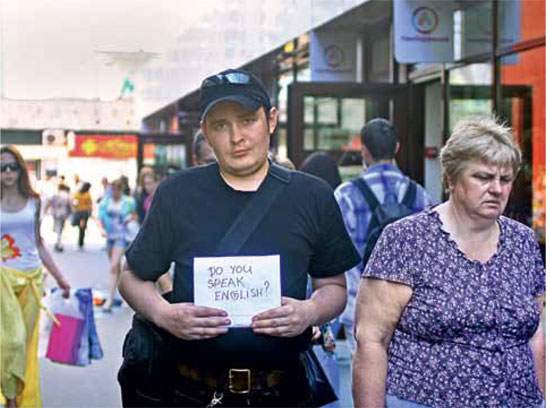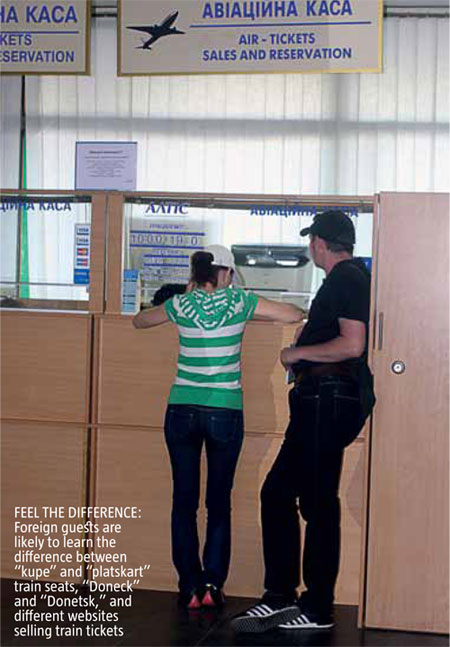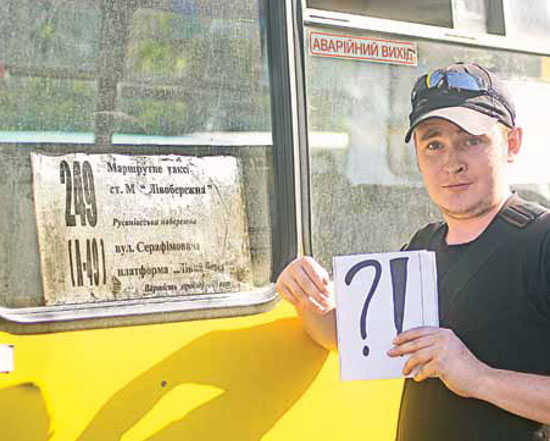Welcome to Ukraine – a country where police are scarier than criminals, dogs are burned alive, the mafia attacks hotels and virtually every woman is a hooker waiting to infect you with HIV and steal your wallet. Most of what foreigners have been told about problems in Ukraine amounts to no more than rumours spiced up by the press. Most European TV channels and publications have no staff reporters in Ukraine. Moreover, many reporters tend to focus on bad news alone, and the resulting image of Ukraine is indeed frightening. The Ukrainian Week spent a few days with foreign tourists to find out what problems average guests encounter when traveling to Ukraine.
UNDISCLOSED PRICES
Hotel prices in Ukrainian host cities really are scary. Some still refuse to reveal their football season prices. Kozatsky Stan, a three-star hotel in Kyiv, for instance, normally charges UAH 800-2,000 for a one-bed room, yet the price is effective only until June 9th. “Then, prices will grow twofold but they depend on the dates. The finals are on July 1st and the price will be high,” the administrator says. Just how high it will rise remains unknown, however.
Renting an apartment is an alternative option. Landlords are also reluctant to disclose prices until the very last moment. “How much are you willing to pay?” they wonder. Liudmyla rents out three apartments within a 15-minute walk of the Livoberezhna metro station for UAH 400 per night. She says the apartments have not yet been booked for the Euro games, and has not revealed the price for the time of the tournament. “We’ll see how many people come,” she says, adding that she is going to raise it twofold for Ukrainians and threefold for foreigners. This price policy is currently in effect in all four Euro 2012 host cities in Ukraine.
“Take some efforts, look at as many options as possible,” Frank, an American citizen who has been living in Kyiv for years, recommends. “The agencies that rent out apartments on a daily basis always speak English. And feel free to bargain, it’s as common in Ukraine as it is in Turkey. Whenever the locals hear a foreign language, they automatically raise the price. But they can offer you a better price eventually once they realize that you’re not willing to overpay.” Another problem with renting an apartment is booking one. Most agencies can confirm the booking with an email only. A reply, such as “Transfer half of the amount to my phone account and we’ll keep the apartment for you,” could signal fraud. Also, even once you’ve got a reservation, the landlord might simply refund your money if they find someone else who is willing to pay more. As a result, renting an apartment is cheaper while booking a room in a hostel is more reliable.

POOR TRACK RECORD
“The Ukrainian railway system has undergone unprecedented transformations leading up to Euro 2012,” the railway website boasts, adding that it “is introducing a new online ticket search and sales service.”
The Ukrainian Week asked Andy, a Briton, to buy a ticket from Kyiv to Donetsk. “One of the options is to buy the ticket at the office,” Andy claims. “You click on the link to find the locations of ticket offices and end up with a map of Ukraine with oblasts written out in Ukrainian only. I had to google an alternative English-language map and find Kyiv Oblast by comparing the shapes of oblasts, only to find the list of cities in Ukrainian again, just like the locations of ticket offices…”
Ultimately, Andy decided to purchase his tickets online, following a link to e-kvytok.ua. “You need to register there to buy a ticket,” he says. “But that’s okay, it does have everything in English. Once registered, I looked under ‘Sample Documents’ for ticket samples. This section shows what the order form, ticket return form and electronic ticket look like. Document titles are in English, but the tickets are actually in Ukrainian. I can guess where the departure and arrival time is because I remember that when I order one. But I can’t figure out the train, car and seat numbers.”
Later, Andy tried to book a ticket but failed to do so in English. Even when he clicked to switch the website into English, the menu on top of the page remained in Ukrainian, and the whole booking process continued in Ukrainian. Purely by accident, Andy clicked on a rescue link saying “Dear clients! The updated version of the website is at http://www.e-kvytok.org.ua” But users cannot log into the new website using the name and password registered for the old one. Moreover, the Ukrainian railway’s website still links to the old e-ticketing website for some bizarre reason. Once yet another registration was completed, Andy typed in Kyiv as his departure station in the ticket search application. He found that there is only “Kiev,” not “Kyiv,” and Donetsk does not exist either. Instead, the website offers the misspelled “Doneck,” which would leave many Ukrainians, let alone foreigners, wondering whether the mysterious Doneck is the host city they are looking for. After choosing the date of the trip and selecting randomly between “kupe” and “plackart” seating, Andy found out that he cannot pay for the ticket for technical reasons, nor can he book one. With that in mind, the ban on booking tickets earlier than 45 days prior to departure no longer appears to be the biggest challenge.
The last option is to translate ticket office addresses from Ukrainian into English, wait in line and buy tickets in person in Ukraine. A clerk at the ticket office in Kyiv looks taken aback when spoken to in a foreign language. It takes her just a minute, though, to stop panicking. She gestures to the foreigner that he must wait while she finds a colleague who speaks English.

SPEAK UP OR MISS YOUR STOP
Only a year ago, foreigners riding the Kyiv metro were faced with deciphering confusing signs written in Cyrillic. Today, the signs feature metro station names in English along with their numbers.
What about other public transport? Traveling to Berezniaky, a district of Kyiv far more accessible than the non-existent Doneck, can be mission impossible for visiting foreigners. Finding any online English-language information about marshrutkas—“route taxi” vans that traverse the city—in Kyiv, let alone Lviv or Kharkiv, is next to impossible. Eventually, the tourist will have to find out the bus number he needs on the spot.
Frank is now used to the Ukrainian lifestyle but he pretended to be a newcomer for The Ukrainian Week. About 20 people are waiting for their marshrutka at a stop next to Livoberezhna metro station. We ask them how to get to vulytsia Tychyny (Tychyna street). “Marshrutka… bus! bus!” a guy says pointing at the line waiting for the bus Frank apparently needs to take. The driver speaks no English, so he does not quite understand Frank’s request to be informed when he should get off. The other passengers give their own advice, while also trying to find out where Frank is going, why he is going there, and whether he likes it in Kyiv. That seems like a piece of cake for an extrovert.
A misunderstanding may occur in Ukraine when a tourist wants to rent a car. A group of British football fans did so to travel around the country. “Ukrainian drivers have this strange way of driving,” Laurence says. “They often use the British side of the road, especially on rural roads.”
British gas stations pump gas first and then you pay for the amount. “We put in the pump and went to the store,” they share. “When we came back to the car, we couldn’t figure out how much gas had been pumped. 20 liters, we thought it was, so we paid for it. When we left, we realized that no gas had been pumped, as you first have to pay for it in Ukraine before heading to the pump. So, we had to go back!”

SIGN LANGUAGE
The language barrier isn’t so scary in Ukraine unless you try to talk to the police, clerks, salespeople and the like. Still you’re likely to find at least one person that speaks English on the street. Otherwise, gesturing can help.
Ordering services by phone is a different matter altogether. This includes trying to call a cab. Out of 10 taxi companies we called, only three spoke English well enough to take our order. Two others switched us to different operators. Five out of ten couldn’t speak any English at all. But don’t panic and run for a taxi on the street—you’ll surely end up overpaying.
TAXI, TAXI!
At this point, we are trying to catch a taxi at the railway station in Kyiv. We need to go to Maidan Nezalezhnosti, Independence Square in English. Obviously, getting a cab at the railway station is always more pricey, even for someone who speaks Ukrainian. That is an unspoken rule among local taxi drivers. As foreigners, we are offered a trip to the capital’s heart for UAH 200 ($25 or €19). Eventually, we knock the price down to UAH 100. Ukrainians will easily get UAH 100 as a starting price but they can bargain a taxi down to UAH 50 and 40 if they try their best. A taxi called by phone can cost you UAH 30 for similar distance, which is six times less than what the railway taxi drivers offer English speakers.
Actually, anyone can charge a foreigner an extra penny anywhere in Ukraine. “I rented a one-room apartment 30-minutes by foot from the Chernihivska metro station when I first came to Kyiv for UAH 500 per night,” Jonathan, an Irishman, says. “I was so happy with it until I told my Kyiv friends about it. They said I was paying almost double the normal price and the apartment should cost less than UAH 3,000 per month.” Today, he recommends that tourists compare prices for lodging and souvenirs sold in the street, and not be afraid of provocations, such as calling the police.
ABOVE THE LAW
“Lately we’ve been hearing that Ukrainian police are uncontrolled, not merely corrupt,” Dougie Brimson, a British writer and author of books about football fans, tells The Ukrainian Week. He is convinced that Euro 2012 guests might run into numerous troubles with the police at the tournament because fans drink hard and make a lot of noise. Yet, he does not recommend solving these problems in a common way. “It’s outrageous in our country when a police officer asks for a bribe,” he says. “If that happens in Ukraine, it will have a very bad impact on the country’s image.” Jonathan recommends looking for someone who speaks English to help interpret, adding that “Ukrainian police will try to get bribes anyway, from everyone!”
But remember that the police can be right sometimes. Drinking alcohol in the streets can result in a warning or fine of UAH 17 to 85. If asked for a bribe, you can instead agree to go to the police station, lawyers say. “They’ll have to prepare a protocol, fill out a warning and impose a fine if any violation has actually occurred. What they always count on is that the violator would rather pay a bribe than go with them to the station. All that paperwork wastes time that could be spent looking for another fool ready to pay them on the spot.”
This is the Ukrainian reality that foreigners face, including special prices, bad service, greed and bribery. Hopefully, the football celebration and Ukraine’s true hospitality will override any negative impression that foreign guests might have of Ukraine.
WHOM DO THE POLICE PROTECT?
After six police officers beat up and robbed two young men in Lviv, Amnesty International announced that the Ukrainian police were a danger to Euro 2012 fans. John Dalhuisen, Europe and Central Asia Deputy Programme Director of Amnesty International, called on Ukraine to stop neglecting human rights and urgently reform law enforcement authorities before the championship.
UKfans will bring their police to the game to help both UK citizens and Ukrainian police. British police will share their experience and advice with their Ukrainian peers on the best ways to behave in difficult situations caused by fans.
On May 7th, two US and UK citizens aged 26 and 29 who were conducting English classes in Donetsk as part of the Euro 2012 preparations were beaten by police. The victims ended up with broken bones. A criminal case was opened against the violators.
What foreigners fear in Ukraine
1. “Criminal gangs have stormed hotels, some hotel operators have tripled prices and others have cancelled contracts with the tour operators,” says Spiegel Online.

2. Polskie Radio Dla Zagranicy laments the burning alive of dogs in Ukraine to “clean the streets” before the tournament

3. “Watch it on TV at home,” Nederlandse Energie Maastschappij urges Dutch women in a video to prevent their husbands from going to Ukraine for Euro 2012 and falling victim to its beautiful women. Apparently, the video makers were inspired by the speech Viktor Yanukovych delivered in Davos: “All you have to do to discover Ukraine is see it with your own eyes, when the chestnut trees bloom in Kyiv, and women start to undress in the streets. Witnessing this beauty is amazing.”

4. Disappointment is the only emotion a visit to Ukraine could elicit. An ad by WorldSoccerShop.com features a man giving tickets for the football tournament in Ukraine to his girlfriend whose does not appear excited about the trip at all.

5. Prostitutes, many of them HIV-infected, will flood Euro 2012 host cities, warns The SUN, a UK tabloid.

6. Athird of Germans want their football team to boycott the European football Championships in Poland and Ukraine in protest of the treatment of former Ukrainian Prime Minister Yulia Tymoshenko, reports thelocal.de, a German portal.

7. According to the UK-based Mirror, Euro 2012 fans fear terrorist attacks after bombs rocked Dnipropetrovsk.


